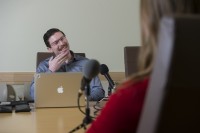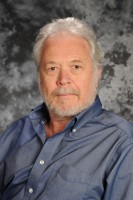Silicon Valley Startup Pro Shifts Focus to Nuclear Energy
An old hand at startups by age 31, Bret Kugelmass is not one to do things by halves. He believes climate change poses a mortal threat to humanity, and that the widespread adoption of nuclear energy is the only way to stem the tide of catastrophe.
 After selling his high-tech company, Airphrame, in 2017, Kugelmass moved from Silicon Valley to Washington, D.C., setting himself up as president of the Energy Impact Center. Since October, he has been collecting interviews for his Titans of Nuclear podcast.
After selling his high-tech company, Airphrame, in 2017, Kugelmass moved from Silicon Valley to Washington, D.C., setting himself up as president of the Energy Impact Center. Since October, he has been collecting interviews for his Titans of Nuclear podcast.
With his advocacy of nuclear energy, it was inevitable that a trip to Idaho National Laboratory (INL) would be in order. ANS member Todd Allen - formerly of INL and now with the think tank Third Way - recommended he visit Idaho.
"I had no idea of what to expect," he said. His two-day visit in January included a trip to the Advanced Test Reactor Complex and Materials and Fuels Complex ("I didn't know what a hot cell was," he said). At MFC, he ended up being present for the first transient test in the newly restarted Transient Reactor Test Facility (TREAT).
Asked to describe what he saw in a word, Kugelmass chose "versatility," which he considers key. "Versatility is about looking to the future," he said.
The second day of the trip was devoted to recording podcasts with INL people, including
- John Wagner, associate laboratory director for INL's Nuclear Science & Technology directorate
- George Griffith, INL small modular reactor technical coordinator
- Hans Gougar, director of INL's Advanced Reactor Technologies Division
- Shannon Bragg-Sitton, lead of INL's nuclear-renewable hybrid energy systems
- Emma Redfoot, a University of Idaho nuclear engineering graduate student and a leader in the Students for Nuclear organization
In 2009, Kugelmass started as a mechatronics engineer for Nanosolar, a manufacturer of thin film solar cells. He then funded his graduate education in robotics at Stanford by simultaneously running an electric car R&D lab for Panasonic. After his master's program, he started Airphrame, a company that designed the technology to control fleets of drones over the internet.
As he pursued those ventures, however, Kugelmass, in a growing state of concern about global warming, started studying carbon-free methods of energy production. This included nuclear.
"I had to revisit my assumptions and all the things I thought I knew about nuclear energy," he said. He found both a severe disconnect and steep learning curve between nuclear and "tech adjacent" communities. These represent impediments to innovation, financing, and social acceptance.
In the end, he came to the conclusion that nuclear power is the only alternative for carbon-free energy on a mass scale. The waste problem is a problem, but not on the scale that opponents would have everyone believe.
"If anyone is willing to sit down for five hours and do the math, they will come to the same conclusion, that nuclear can do it all," Kugelmass said.
With the Titans of Nuclear podcast, he has made it his mission to bridge the gulf by creating an "audio encyclopedia of the greatest minds in nuclear energy," opening the field to environmental-minded technologists who might otherwise favor alternate approaches.
"Solar has done an incredible marketing job," he said. "The fossil fuel industry has the best marketing minds in the world working for them."
As for natural gas, embraced in the past 10 years as the alternative to coal, methane is even 22 times more pernicious a greenhouse gas than the carbon dioxide coming from coal-fired plants.
"We've got to bring the whole world out of poverty, and to do that we're going to need energy," he said. Uranium is not only loaded with millions of times more energy than fossil fuels, there's also 25 times more of it in the crust of the Earth.
Kugelmass said his target audience is not people in the nuclear industry, but clean tech professionals involved in engineering and science and other fields. "I know how difficult it can be when there is a limited supply of talent," he said. "I hope to open up the pool of available people."
In his personal network, Kugelmass shares Stewart Brand's 2010 book "Whole Earth Discipline: Why Dense Cities, Nuclear Power, Transgenic Crops, Restored Wildlands, and Geoengineering Are Necessary." Brand's environmentalist and counterculture credentials go back to 1968, when he began publishing "Whole Earth Catalog." In 2009, he went public with his embrace of nuclear energy, telling Newsweek, "I've gotten to the point now that even if carbon dioxide in the atmosphere, greenhouse gases, and climate change were not significant issues, I would still probably be pro-nuclear."
Kugelmass agrees with the conclusions in Brand's book. "Environmentalists need to get their heads on straight," he said. And for its part, the nuclear industry needs to embrace new thinking and articulate a clear, positive message.
"For every good idea, you need ten startups working on it," he said.
Titans of Nuclear Podcast Schedule:
- John Wagner, Feb. 14
- Hans Gouger, Feb. 21
- Shannon Bragg-Sitton, Feb. 28
- George Griffith, March 7
- Emma Redfoot, March 14
_______________________________________________________________
 Paul Menser is a senior science writer for North Wind Group in Idaho Falls, working under contract for Idaho National Laboratory. From 1981 to 2008 he was a writer and editor at the Idaho Falls Post Register, for which he still writes a weekly history column. He is the author of "Legendary Locals of Idaho Falls," released in 2015 by Arcadia Publishing.
Paul Menser is a senior science writer for North Wind Group in Idaho Falls, working under contract for Idaho National Laboratory. From 1981 to 2008 he was a writer and editor at the Idaho Falls Post Register, for which he still writes a weekly history column. He is the author of "Legendary Locals of Idaho Falls," released in 2015 by Arcadia Publishing.

